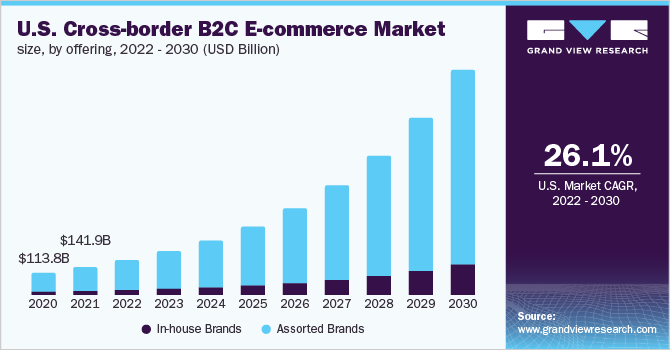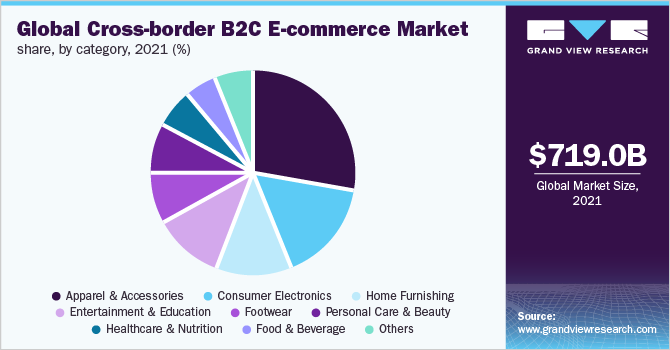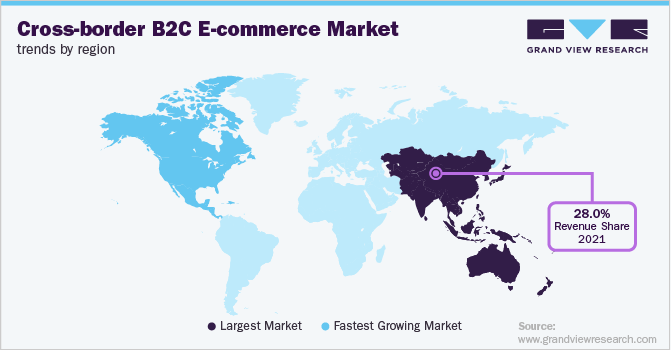
Cross-border B2C E-commerce Market Size, Share & Trends Analysis Report By Offering, By Payment Method (Digital Wallets, Credit/Debit Cards, Internet Banking), By Category, By Region, And Segment Forecasts, 2022 - 2030
- Report ID: GVR-4-68039-977-5
- Number of Report Pages: 130
- Format: PDF
- Historical Range: 2017 - 2020
- Forecast Period: 2022 - 2030
- Industry: Technology
Report Overview
The global cross-border B2C e-commerce market size was valued at USD 719.02 billion in 2021 and is expected to expand at a compound annual growth rate (CAGR) of 25.8% from 2022 to 2030. The increasing young metropolitan population and its reliance on technology for online shopping through e-commerce is the primary factor driving the industry's growth. Moreover, the rising internet and smartphone perforation are expected to drive growth as most millennials use smartphones and tablets to order goods. The market is further driven by the growing preference for online shopping due to social media's influence on customers' shopping habits.

It is anticipated that the scarcity of goods in domestic markets would positively influence the cross-border B2C e-commerce market as it provides customers with higher quality products at affordable costs. Moreover, small and medium-sized firms benefit from cross-border e-commerce as they continuously focus on growing their operations globally and increasing their scalability. Furthermore, there would be numerous growth prospects for industrial expansion globally due to the rising digitalization across the globe. As a result, increasing digital transformation by businesses to expand across numerous public and private industries is further expected to propel market growth.
Cross-border B2C e-commerce is based on internet information technology. As a result, it expands the network for developing businesses, conducts paperless transactions, and eliminates downtime-related obstacles. Hence, many companies are focused on growing internationally owing to the reduced costs and higher profitability of e-commerce trades. Rising international trade between nations and the growing company mergers & acquisitions for expansion are anticipated to create profitable prospects for the market.
The scope of growth for the market has increased with the introduction of cutting-edge e-commerce technologies such as digital wallets for making online payments safely. For instance, in Aug 2019, Citibank launched a global wallet that allows its customers to make an online purchase without involving foreign currency conversion across 150 countries. In addition, free trade pacts and globalization with favorable Foreign Direct Investment (FDI) policies are expected to promote cross-border e-commerce activities. As a result, consumers enjoy convenient shopping at affordable costs, which is boding well for the industry’s growth.
However, the rising adoption of digital solutions for the cross-border e-commerce market coexists with a recurring obstacle for vendors as they have to deal with fraudulent activities and cyber threats. This challenge hinders the market's growth to a certain extent. Although, several merchants and platforms are integrating numerous solutions for mitigating the losses which occur due to such incidences. For instance, in 2021, major cross-border payment service providers such as PayDo, and Pollen technologies are utilizing biometrics and compliance technology solutions by Trulioo Global gateway to meet stringent cross-border prerequisites.
COVID-19 Impact Analysis
The spread of the COVID-19 virus has highlighted the need for flexible cross-border e-commerce transactions. Therefore, with the outbreak, it has become necessary for B2C brands to implement effective multichannel strategies to aid these cross-border e-commerce activities. Moreover, organizations are entering into a business deal with consumers via direct-to-consumer (D2C) channels, thereby preventing delivery delays. For instance, Apple, Inc. sells through D2C channels directly to their customers through virtual stores or contract deals. This move is expected to result in market development over the forecast period.
Offering Insights
The assorted brand segment dominated in 2021 and accounted for a share of over 84.0% of the global revenue. This growth is attributable to the variety of merchandise the cross-border e-commerce market offers its customers. Therefore, a large variety of product lines has become globally available, thereby attracting consumers to shop as per their preferences. Furthermore, it helps businesses determine the consumer interactions leading to purchase.
The in-house segment is anticipated to grow at a promising CAGR over the forecast period. The changing preference of global online shoppers for innovative products and ordering all of their goods through one international in-house brand is driving the segment growth. For instance, in 2022, a survey conducted by WUNDERMAN THOMPSON, U.S. based growth partner organization, found that 50% of online consumers expect and shop for innovative brands. Furthermore, 62% of shoppers preferred ordering goods through one retailer.
Payment Method Insights
The credit/debit cards segment accounted for a share of more than 55.0% of the global revenue share in 2021. The widespread acceptance of credit/debit card payments across all e-commerce platforms is responsible for the significant market share. Furthermore, technological developments such as using blockchain for enhanced security are expected to boost the segment’s growth over the period. In addition, exclusive rewards and perks obtained by using credit/debit cards are also contributing to the segment growth.
The digital wallets segment is anticipated to grow at the highest CAGR over the forecast period. The introduction of international B2C payment platforms through digital wallets is expected to drive the segment’s growth. For instance, in 2021, HSBC bank launched a global multi-currency virtual wallet for international transactions. This allows wallet users to streamline international payments with minimal documents. Furthermore, the expansion of numerous digital wallet companies is expected to present various opportunities for the segment to grow internationally with greater financial inclusion.
Category Insights
The apparel & accessories segment held the largest revenue share of more than 27.0% in 2021. The expansion of international trade has accelerated the demand for online shopping of apparel and accessories through e-commerce platforms which are expected to drive segment growth. Moreover, consumers enjoy better choice selection and product deals due to increased competition globally. In addition, the increasing use of technology in B2C payments and the developing global shopping ecosystem are also boding well for segment growth.

The entertainment & education segment is anticipated to grow at a promising CAGR over the forecast period. The rising adoption of books for studying and music & video games for entertainment is anticipated to significantly boost the segment’s growth. Consumer accessibility aids this growth to various brands and network connectivity globally. Therefore, providing users with global access to the latest media and e-book stores with enhanced data and payment integrity is expected to create lucrative growth opportunities for the segment.
Regional Insights
Asia Pacific dominated the cross-border B2C e-commerce market in 2021 and accounted for a share of over 28.0% of the global revenue. The dominance is attributable to the large customer base in the region. Moreover, the rising international trade relations in the area are expected to propel regional growth. For instance, China strengthened its free trade agreement with New Zealand because of its good international trade relations with the nation. This trade pact allows faster export procedures, increased market access, and expanded tariff-free programs. Therefore, such trade pacts are influencing the industry growth during the forecast period.

North America is expected to witness significant growth over the forecast period. This growth is attributable to the increasing demand for reasonably priced, high-quality products. Moreover, this region's high Price Level Index (PLI) contributes significantly to the regional market growth as it allows customers to shop for a product at an affordable rate. For instance, the PLI of the U.S. is 113 and China is 59; this allows regional shoppers to get lower prices domestically.
Key Companies & Market Share Insights
The market can be described as competitive characterized by several prominent players. Industry leaders are exploring several business strategies to broaden their market reach, including partnerships, mergers & acquisitions, and other strategic alliances. For instance, in 2022, Shopify and Chinese e-commerce business JD.com teamed up to widen the seller's reach. As a result, the JD Marketplace channel was added to the Shopify platform, enabling merchants to set up business in China in 3 weeks rather than the standard 12 months.
Major global e-commerce platforms also focus on commercial relationships and partnerships with tech-enabled cross-border payment solution providers to extend their cross-border e-commerce capabilities and solutions. For instance, in July 2022, global e-commerce player Global-e and Pitney Bowes, through a cross-border business deal, are localizing shopping portals to 200+ territories and are simplifying compliance processing. This deal is expected to bring high value to international customers and enhance the global e-commerce market. Some prominent players in the global cross-border B2C e-commerce market include:
-
Amazon.com, Inc.
-
Alibaba Group Holding Limited
-
eBay Inc.
-
ASOS
-
Jingdong JD.com
-
Fruugo.com Ltd.
-
Veepee
-
Rakuten
-
SIA Joom (Latvia)
-
Zalando
Recent Development
-
In February 2023, eBay Inc. acquired 3PM Shield to provide monitoring solutions to prevent the sale of counterfeit and illegal products. The primary purpose of this acquisition is to further enhance eBay's monitoring solutions with new technologies designed to prevent the sale of counterfeit items, unsafe products, and illegal goods on its platform.
Cross-border B2C E-commerce Market Report Scope
|
Report Attribute |
Details |
|
Market size value in 2022 |
USD 888.57 billion |
|
Revenue forecast in 2030 |
USD 5,576.73 billion |
|
Growth rate |
CAGR of 25.8% from 2022 to 2030 |
|
Base year of estimation |
2021 |
|
Historical data |
2017 - 2020 |
|
Forecast period |
2022 - 2030 |
|
Quantitative units |
Revenue in USD Billion and CAGR from 2022 to 2030 |
|
Report coverage |
Revenue forecast, company market share, competitive landscape, growth factors, and trends |
|
Segments covered |
Offering, payment method, category, region |
|
Regional scope |
North America; Europe; Asia Pacific; Latin America; MEA |
|
Country scope |
U.S.; Canada; Germany; U.K.; France; China; India; South Korea; Japan; Brazil; Mexico; UAE; Saudi Arabia |
|
Key companies profiled |
Amazon.com, Inc.; Alibaba Group Holding Limited; eBay Inc.; ASOS; Jingdong JD.com; Fruugo.com Ltd.; Veepee; Rakuten; SIA Joom (Latvia); Zalando |
|
Customization scope |
Free report customization (equivalent to up to 8 analysts working days) with purchase. Addition or alteration to country, regional & segment scope |
|
Pricing and purchase options |
Avail customized purchase options to meet your exact research needs. Explore purchase options |
Global Cross-border B2C E-commerce Market Segmentation
The report forecasts revenue growth at global, regional, and country levels and provides an analysis of the latest industry trends in each of the sub-segments from 2017 to 2030. For this study, Grand View Research has segmented the global cross-border B2C e-commerce market report based on offering, payment method, category, and region:

-
Offering Outlook (Revenue, USD Billion, 2017 - 2030)
-
In-house Brands
-
Assorted Brands
-
-
Payment Method Outlook (Revenue, USD Billion, 2017 - 2030)
-
Digital Wallets
-
Credit/Debit Cards
-
Internet Banking
-
Others
-
-
Category Outlook (Revenue, USD Billion, 2017 - 2030)
-
Entertainment & Education
-
Apparel & Accessories
-
Consumer Electronics
-
Home Furnishing
-
Personal Care & Beauty
-
Healthcare & Nutrition
-
Footwear
-
Food & Beverage
-
Others
-
-
Regional Outlook (Revenue, USD Billion, 2017 - 2030)
-
North America
-
U.S.
-
Canada
-
-
Europe
-
U.K.
-
Germany
-
France
-
-
Asia Pacific
-
China
-
India
-
South Korea
-
Japan
-
-
Latin America
-
Brazil
-
Mexico
-
-
Middle East & Africa
-
UAE
-
Saudi Arabia
-
-
Frequently Asked Questions About This Report
b. The global cross-border B2C e-commerce market size was estimated at USD 719.02 billion in 2021 and is expected to reach USD 888.57 billion in 2022.
b. The global cross-border B2C e-commerce market is expected to grow at a compound annual growth rate of 25.8% from 2022 to 2030 to reach USD 5,576.73 billion by 2030.
b. Asia-Pacific dominated the cross-border B2C e-commerce market with a share of 28.39% in 2021. The region's growth can be ascribed to the rising international trade relations in the area.
b. Some key players operating in the cross-border B2C e-commerce market include Amazon.com, Inc.; Alibaba Group Holding Limited; eBay Inc.; ASOS; Jingdong JD.com; Fruugo.com Ltd.; Veepee; Rakuten; SIA Joom (Latvia); Zalando.
b. Key factors that are driving the market growth include Increasing young metropolitan population and Increasing penetration of smartphones & internet.
We are committed towards customer satisfaction, and quality service.
"The quality of research they have done for us has been excellent."




